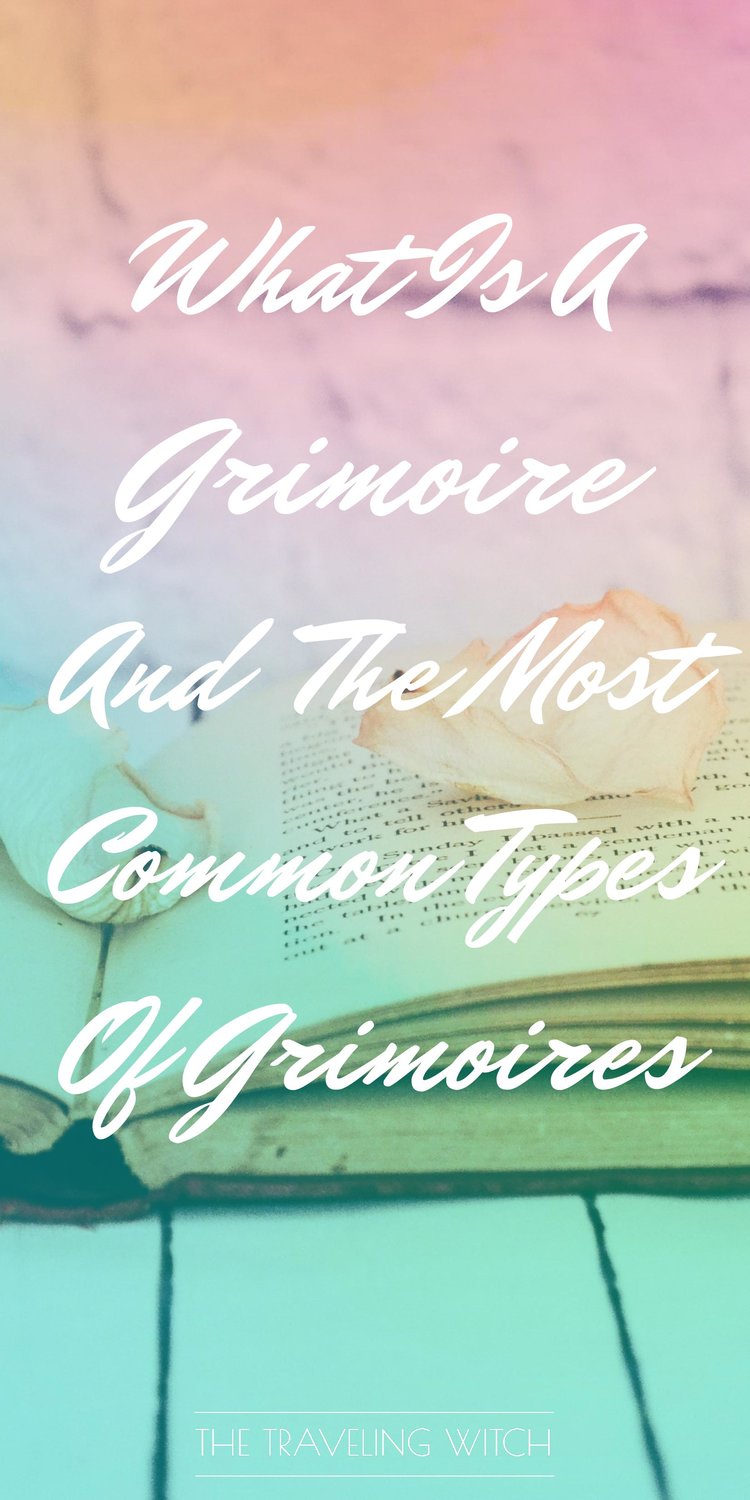I’m going to kick off this Grimoire series by letting you know that I am a bit of a book addict, specifically a notebook addict. If I can write in it I’m probably going to at least pick it up and give it stiff consideration. Thankfully my exacting tastes when it comes to paper quality, color, notebook size, binding, and line style has saved me from amassing TOO many notebooks but… well, I’ve still managed to create quite a little collection.

And the vast majority of them end up being turned into some kind of grimoire.
So What Is A Grimoire?
The term “grimoire” is a bit of a catch-all. There are few really concrete and consistent definitions that go beyond “a book of magic”. Some people say it’s more of a textbook, meant to be passed on to a mentee as a teaching tool. Others say it’s a sort of magical recipe book, used for recording spells for later use. Most of these definitions are far too limited in scope for the reality of modern grimoires.
In reality, the grimoire is as varied a tool as every other part of the craft. Each witch will have their own version of what a grimoire is and they will construct theirs accordingly. This is a wonderful thing! Like any tool in the craft, grimoires must first be useful to us. There’s no point in having a fancy manuscript stuffed full of information that you never use.
What’s The Difference Between A Grimoire & A Book Of Shadows?
This is a question I hear all the time. The answer is really quite simple though. A book of shadows is a grimoire specific to the practice of Wicca, it was a term originally coined to describe the ritual texts of Wicca. This word has found its way into the broader world of witchcraft and you’ll often see it discussed in neo-Wicca circles but I personally prefer to leave the practices and customs of initiatory religions well within those religions.
For all non-Wiccan witches, the appropriate term to use is grimoire. You can, of course, also name your book something else if you like! I have seen many lovely grimoires that had beautiful and very personal titles.
What Types Of Grimoires Are There?
Spell Books
This type of grimoire is essentially a recipe book of spells. The pages are filled with ingredients, instructions, and illustrations for spells, either those you have found and want to keep or those that you have written yourself. Spellbooks often will also contain oil and powder formularies, actual recipes (for the kitchen witch), and space for notes to be made about the spells.
Journal Style
This is one type of grimoire I recommend everyone keep, especially while they’re just beginning. The journal style grimoire is exactly what it sounds like. It’s written chronologically, rather than being split into subject-based sections, and each entry is typically dated. This sort of grimoire serves as a sort of catch-all. You can capture anything from spells to herbal notes to dreams, tarot readings, and your personal thoughts and feelings about magic and your experiences in the craft.
This can be an invaluable resource for beginners. Not only does it allow you chronicle your learning journey so that you have a real record of how much you’ve progressed, it allows you to learn and collect information without the startup hurdles. Often new witches will refrain from recording information because they’re not sure of what they’re doing. They don’t know how they should organize a book, whether or not certain information will be pertinent later, etc. A journal grimoire streamlines that process and ensures you’re capturing information regardless. You can always transfer the info to a more structured book later!
Pocket Grimoire
This is another favorite of mine. Pocket grimoires are exactly what they sound like, they’re small, pocket-sized notebooks that contain just the essentials. What are “the essentials”? That depends on your craft. If might be a collection of emergency spells. It might be a book of basic herbs, crystals, and ingredients along with their correspondences and uses in spells so that you can always work with what you have on hand. It might be just a book of incantations that require no ingredients at all. Whatever you put in a pocket grimoire, the intent is to have it be a handy reference for when you’re out and about. I keep mine in my purse and use it ALL the time.
Book of Dreams
A book of dreams is similar to a journal style grimoire in that it’s written chronologically with dated entries. As you might expect, it’s primarily used to record dreams. A book of dreams can also be used for a few other purposes though, it also makes an excellent place to record your astral travel and meditations as well as your interpretations of your dreams. If you’re particularly interested in dream work you may also use this as a place to study symbolism and the meanings of events in your dreams.
Subject-specific grimoire
This is really a rather broad category of grimoire because you can make grimoires about pretty much ANY witchcraft subject. Herbal magic, kitchen witchcraft, astrology, tarot, sigil craft, ocean magic, urban witchcraft, art magic, techno-magic, pop-culture witchcraft, the list goes on. If it’s a part of your personal craft you can probably make a grimoire dedicated to it. Because these grimoires vary so much in subject they vary a lot in organization, structure, and material as well! They might be small or large, typed, purely visual journals or any number of other variations.
Religious grimoire
A religious grimoire is used to document your personal religion. This is an excellent way to connect more deeply with your gods and really dig into what you truly believe in regard to spirituality and religion. Record all of your religious beliefs, prayers, letters to your gods, devotional acts, holy days, and more in this grimoire. If you choose to use this variety of grimoire, always think of it as a living document. it is never truly finished, your religion will change and morph over time and taking on the mindset that your religious grimoire is finished can stunt your spiritual growth and cause you to resist changing past that point.
The Mashup
The mashup is an amalgamation of any of the above styles. It’s essentially the grimoire of a witch who took a look at this list and wanted all (or some) of these but decided to shove it all into one giant, overstuffed, lovely manuscript. I love mashup grimoires. While grimoires with a set purpose can be beautiful and highly functional I find the mashup grimoire to be so streamlined (even when the book itself is a mess). Anytime you have information to record you only have one book to put it in, there’s no separation and so, your grimoire becomes an extremely accurate representation of your practice as a whole.
Ok, so now you have a good idea of the variety of styles that grimoires can come in. They can be any size, contain a wide array of information and serve many purposes for the witch who creates one. In the next part of the series, we’ll be discussing how to go about creating your own grimoire!
Grimoires For Beginners Pt. 1: You Are Here!
Grimoires For Beginners Pt. 2: How To Create Your Own Grimoire As A Beginner
Grimoires For Beginners Pt. 3: 8 Ways To Make Your Grimoire Amazing
New to witchcraft?
Sign up for my FREE Witchcraft class!




A ‘mashup grimoire’… I’ve always wondered what it was that I was creating and now I know! I love it!
THANK YOU for writing this!! I get hung up on the details and stop myself from creating one. 🙏🏻❤🕉
Thank you for this! I think I’ll be starting a book of dreams. I have such vivid dreams and I’d love to understand them more.
Thanks! Now I feel free to create the grimoire I have imagined!
One more thing
Why people haven’t discovered much about sorcery?
Funny. So we’re basically using witchcraft all the time, even therapy gives some witchy things to us. Dream journalling, quick example. How exciting.